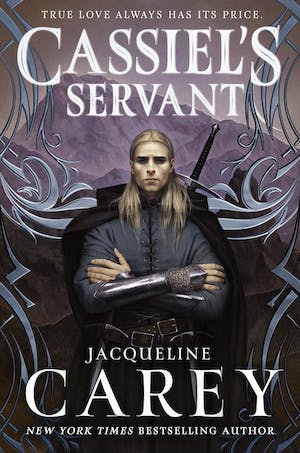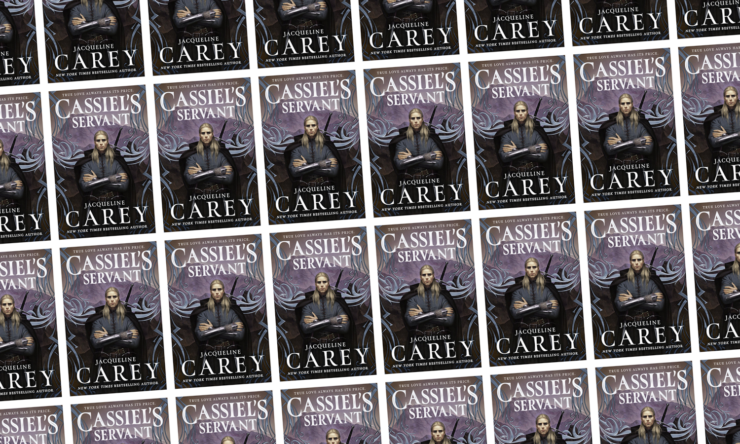Imagine you’re at a party, and you come across an ethereally gorgeous couple: She dark-haired and radiant, he an austere blond. When you ask how they met, she launches into a stunningly romantic tale involving bodyguards and captivity and voyages and sacrifices. But by the time she’s done, though you’re nodding along at their happily-ever-after, you realize that you’ve also missed some details, or taken some of her explanations as gospel without entirely understanding. When your storyteller is inevitably pulled across the room to something shiny, her partner lingers. You ask a clarifying question, and he’s all too happy to offer his own take on the narrative you just heard—the same corroborating points, yet with a different perspective, and filling in some of the questions you didn’t even know you wanted to ask.
That’s what it feels like reading Cassiel’s Servant, the Perfect Companion of novels to Jacqueline Carey’s epic fantasy Kushiel’s Dart, about courtesan-spy Phèdre nó Delaunay. While there are no world-redefining twists to be found, Joscelin Verreuil’s retelling does reward with several key personal revelations, as it renders the Cassiline warrior less inscrutable and more flesh-and-blood. First-time readers may find themselves missing some of the nuance of this duo’s incredible quest, but longtime fans will come away feeling as if they’ve gotten to know Joscelin even better than before.
It seems very fitting that Joscelin’s story should emerge now, twenty-plus years after Phèdre’s story, when the subgenre has a new name: romantasy, a catch-all summation for how we used to describe Kushiel’s Dart to one another: Well, it’s an epic fantasy, but the main character has a bunch of romantic (and erotic) subplots alongside all the courtly intrigue… Except that it’s equally difficult to confine Cassiel’s Servant to a single word, or even portmanteau. It transcends other romance retellings that exist solely to titillate from the romantic hero’s perspective, like Midnight Sun (Twilight) or Grey (Fifty Shades of Grey), in that it sketches new detail into Carey’s lush fantasy world. Yet it’s also no replacement for Kushiel’s Dart—though it’s an excellent complement.
Buy the Book


Cassiel’s Servant
When we met Joscelin in Kushiel, he was the grumpy, disciplined bodyguard accompanying Phèdre on her assignations; and despite wearing the Cassiline greys, his views were staunchly black-and-white. What made him intriguing was how he was committed to protecting her from her more heavy-handed patrons even as he openly disapproved of how she undertook Naamah’s Service—and especially how she used the dark desires conferred to her by Kushiel’s Dart to uncover a royal conspiracy within the court of the City of Elua, with ramifications for the entirety of Terre d’Ange. And of course he was doomed to fall in love with her, challenging him to break nearly every vow even as he sought to embody the Perfect Companion in the mortal realm.
The biggest filling-in of Carey’s already-detailed worldbuilding is the line descended (metaphorically, of course) from the angel Cassiel, Blessed Elua’s Perfect Companion charged to forever protect and serve. On earth, that’s the Cassiline Brotherhood, a cadre of warrior-priests trained in the fatal fighting arts, strictly-devoted to protect their wards to the point of death if required—at their own hand, in the terminus—and self-disciplined by their vow of celibacy. Readers have always known that D’Angeline households offer up their middle sons to the Brotherhood, but through Joscelin’s upbringing we actually get a sense of how the quirk of birth order determines one’s fate—or, in the case of his dear friend Selwyn, how losing two elder brothers forces him into this role despite being so lamentably unsuited to the sacrifice.
Selwyn de Gaunte is one of the rare new characters we get to meet thanks to Cassiel’s Servant, with his impact on Joscelin’s life entirely confined to the Cassiline’s pre-Phèdre existence. Most notably, the ways in which the audacious Selwyn compels stern, rules-adhering Joscelin to question some of their strictest vows, as well as what it means to die for someone you love, or whose cause you love. Carey writes this formative boyhood friendship with enough ambiguity to be read in different ways, but one in particular that brings a new dimension to how we regard the workings of Joscelin’s heart.
Speaking of that pesky organ, his first impression of Phèdre both foreshadows how he will fall hopelessly in love with her, while still acknowledging that these two scions share the same pitfall: Each would love to be the ideal vessel for their respective angel, aspiring to the ethereal, but more often than not they are reminded of how flesh-and-blood they are. Carey doesn’t hold back on Joscelin’s shock with his posting in Anafiel Delaunay’s household, as well as his mounting disgust with guarding the impulsive anguissette in particular. It’s really fun to watch Phèdre push his buttons… until, of course, all of her bed-hopping intrigue propels them into the realm of tragedy.
In contrast to Kushiel’s Dart being a doorstopper before George R.R. Martin and Brandon Sanderson were turning out epically long fantasies, Cassiel’s Servant feels like a more manageable length despite covering the same narrative ground. Joscelin’s recounting tends to move more briskly over places where Phèdre would have lingered in her telling, acknowledging events in more of a bigger-picture context. That means no long passage on how he spends the Longest Night in Elua’s Vigil while Phèdre is being paraded around the Midwinter Masque, though we are treated to his reactions to Phèdre’s patron and Delaunay’s rival Melisande Shahrizai—and reader, it will not necessarily be what you expect.
As I said before, romance retellings from the hero’s perspective often fall short because they’re describing the same courtship just from the opposite perspective. But because Phèdre loves all of her patrons and partners in their own ways, it presents a greater challenge to Joscelin to balance his love for her with this understanding of her nature. Watching his empathy grow during their harrowing ordeals is one of the greatest delights of Cassiel’s Servant.
To wit: Despite the fact that Phèdre, Joscelin, and Hyacinthe spend most of their Alban mission together as both a typical fantasy trio and a familiar love triangle, it’s the Cassiline who has the most unexpected insights into the Tsingano—probably because he can relate to what it means to continually sacrifice what you thought were your heart’s greatest desires in service of following Phèdre to the ends of the earth. Gods-touched Phèdre is often distracted by larger happenings, while Joscelin is more attuned to present mortal business. A late-night heart-to-heart between the young men while Phèdre is merging her anguissette duties with her ambassadorial mission is one of the book’s treasures.
So too is witnessing Joscelin’s reevaluation of his Cassiline vows. When he’s learning the tenets in a vacuum, he thinks it’s as easy as protect and serve, and if he fails to do so, he will be forced to perform the terminus on them both. But there was nothing in the Cassiline training about what it means to hit rock bottom, over and over, or to be so ashamed that you would rather die and to be shamed into living instead. By the time Joscelin has come to revelatory understandings not only of a different meaning of “Perfect Companion,” but also of how to let Cassiel use him the way that Kushiel does Phèdre, you’ll understand how these two are so well-suited to one another.
Joscelin’s ability to balance his love for the courtesan with his acknowledgment that he will never be her sole bed partner seems a bit implausible for this early in their relationship, especially considering what we know of how their bond will be tested as early as in Kushiel’s Chosen. His open-mindedness has the tinge of retroactive correction, tweaking a story to make the teller seem a bit better than they were in the experience of it.
Yet the reader also gets the impression that Joscelin knows he isn’t nearly done learning, whether that’s figuring out how to be the Perfect Companion to the most unlikely partner, or exploring the mysteries of the Yeshuites, or keeping Phèdre from being drawn too deeply into Melisande Shahrizai’s games. Cassiel’s Servant achieves what it set out to do—resolving some small mysteries—while leaving the door open for Joscelin to add his own gloss on the rest of his adventures alongside Kushiel’s Dart.
Cassiel’s Servant is published by Tor Books.
Natalie Zutter will be thinking about Joscelin’s prayer to Cassiel for a while. Talk epic fantasy and romantasy with her on Twitter and elsewhere.










